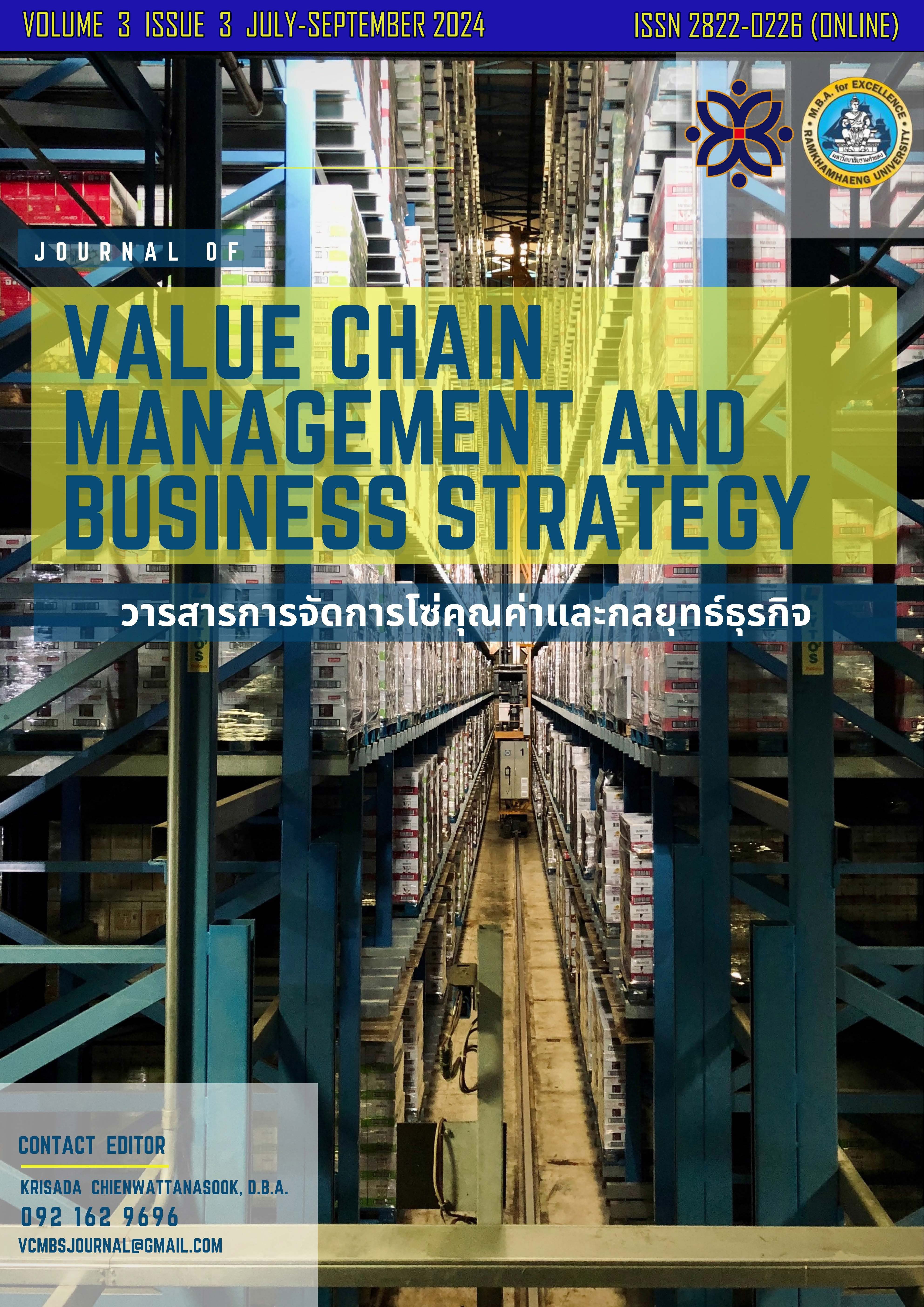ปัจจัยเชิงสาเหตุที่มีผลต่อสมรรถนะนักบริหารทรัพยากรมนุษย์ อุตสาหกรรมชิ้นส่วนยานยนต์ ในประเทศไทย
คำสำคัญ:
คุณลักษณะของนักบริหาร , ภาวะผู้นำเชิงจริยธรรม , การมีส่วนร่วม , สมรรถนะบทคัดย่อ
การวิจัยนี้มีวัตถุประสงค์เพื่อศึกษา (1) คุณลักษณะของนักบริหารที่มีผลต่อสมรรถนะนักบริหารทรัพยากรมนุษย์ อุตสาหกรรมชิ้นส่วนยานยนต์ ในประเทศไทย (2) ภาวะผู้นำเชิงจริยธรรมที่มีผลต่อสมรรถนะนักบริหารทรัพยากรมนุษย์ อุตสาหกรรมชิ้นส่วนยานยนต์ ในประเทศไทย และ (3) การมีส่วนร่วมที่มีผลต่อสมรรถนะนักบริหารทรัพยากรมนุษย์อุตสาหกรรมชิ้นส่วนยานยนต์ ในประเทศไทย โดยการวิจัยนี้เป็นการวิจัยเชิงปริมาณ ประชากรที่ใช้ในการวิจัยคือ พนักงานผู้เกี่ยวข้องในฝ่ายบริหารทรัพยากรมนุษย์จาก 17 โรงงานอุตสาหกรรมผลิตชิ้นส่วนยานยนต์ ซึ่งเก็บรวบรวมข้อมูลด้วยแบบสอบถามจากกลุ่มตัวอย่างจำนวน 400 คน และวิเคราะห์ข้อมูลด้วยการวิเคราะห์การถดถอยพหุคูณ
ผลการวิจัยพบว่า คุณลักษณะนักบริหารที่ดี ภาวะผู้นำเชิงจริยธรรม และการมีส่วนร่วม มีผลเชิงบวกต่อสมรรถนะนักบริหารทรัพยากรมนุษย์ อุตสาหกรรมชิ้นส่วนยานยนต์ ในประเทศไทย อย่างมีนัยสำคัญทางสถิติที่ระดับ .000 โดยมีอำนาจในการพยากรณ์ร้อยละ 78 ดังนั้น ผู้ประกอบการในอุตสาหกรรมชิ้นส่วนยานยนต์ควรใช้ผลการวิจัยในการพัฒนามาตรฐานคุณสมบัติของนักบริหารทรัพยากรมนุษย์ โดยเน้นที่คุณลักษณะนักบริหารที่ดี ภาวะผู้นำเชิงจริยธรรม และการมีส่วนร่วม ทั้งนี้เพื่อเพิ่มสมรรถนะในการบริหารงานทรัพยากรมนุษย์ในองค์กร นอกจากนี้ ควรมีการส่งเสริมการพัฒนาทักษะเชิงจริยธรรมของผู้นำและเปิดโอกาสให้บุคลากรมีส่วนร่วมในกระบวนการตัดสินใจ ซึ่งจะช่วยเพิ่มประสิทธิภาพในการบริหารจัดการและสร้างความยั่งยืนในองค์กร
เอกสารอ้างอิง
กระทรวงอุตสาหกรรม. (2559). ยุทธศาสตร์การพัฒนาอุตสาหกรรมไทย 4.0 ระยะ 20 ปี (พ.ศ. 2560 - 2579). https://waa.inter.nstda.or.th/stks/pub/2017/20171114-oie.pdf
กรุงเทพธุรกิจ. (2564). ศักยภาพผู้ประกอบการ ปรับโลจิสติกส์รับ EEC (ตอนที่ 1). https://www.bangkokbiznews.com/business/947210#google_vignette
ไทยรัฐออนไลน์. (2560). จุดเปลี่ยนประเทศไทย 4.0 จัดทัพลงทุนระเบียงเศรษฐกิจตะวันออก. https://www.thairath.co.th/881941
นปภา มณีรัตน์. (2563). รูปแบบสมรรถนะของผู้ริหาร มรการบริหารทรัพยากรมนุษย์ของอุตสาหกรรม ผลิตชิ้นส่วนยานยนต์ ในภาคตะวันออก. วารสารสังคมศาสตร์, 9(1), 60-69.
บุณยนุช จงวานิช. (2563). คุณลักษณะของผู้บริหารที่ส่งผลต่อการมีส่วนร่วมของชุมชนในการบริหารสถานศึกษาของโรงเรียนชุมชนหมู่บ้านพัฒนา สังกัดสำนักงานการศึกษากรุงเทพมหานคร [Unpublished master’s thesis]. มหาวิทยาลัยเกริก.
แผนพัฒนาเศรษฐกิจและสังคมแห่งชาติฉบับที่ 13 พ.ศ. 2566-2570. (2565, 1 พฤศจิกายน). ราชกิจจานุเบกษา. เล่ม 139 ตอนพิเศษ 258. หน้า 1-143.
ลลิตา เดชเป้า. (2561). การวิเคราะห์องค์ประกอบและโปรแกรมพัฒนาสมรรถนะนักทรัพยากรบุคคลภาครัฐสังกัด กระทรวงแห่งหนึ่ง [Unpublished doctoral dissertation]. มหาวิทยาลัยศรีนครินทรวิโรฒ.
ลัดดาวัลย์ แก่นจักร. (2560). การพัฒนารูปแบบการเสริมสร้างสมรรถนะด้านการพัฒนาตนเอง ของครูโรงเรียนเอกชนในสังกัดสำนักงานเขตพื้นที่การศึกษา ประถมศึกษาสกลนคร เขต 2 [Unpublished master’s thesis]. มหาวิทยาลัยมหาสารคาม.
ศรัณย์ วัฒนา. (2560). การพัฒนาสมรรถนะของทรัพยากรมนุษย์ 4.0 เพื่อเพิ่มประสิทธิภาพการปฏิบัติงานไปสู่ประเทศไทย 4.0 [Unpublished master’s thesis]. มหาวิทยาลัยบูรพา.
สถาบันยานยนต์. (2561). สถาบันยานยนต์ นำทัพจัดระดมสมอง ปฏิบัติการมองอนาคตอุตสาหกรรมยานยนต์ไทย. https://www.thaiauto.or.th/2012/backoffice/file_upload/news/261125611600331.pdf
สำนักงานคณะกรรมการพัฒนาเศรษฐกิจและสังคมแห่งชาติ. (2562). สถานะของภาคการผลิตของไทยภายใต้ห่วงโซ่มูลค่าโลก (Global Value Chain) และการวิเคราะห์ผลกระทบจากการดำเนินนโยบายเศรษฐกิจของประเทศสำคัญ. https://www.nesdc.go.th/download/document/
Macroseminar/2017/Macro2017_Doc03.pdf
Aguinis, H. (2019). Performance Management (4th Edition). Chicago Business Press.
Brown, M. E., Treviño, L. K., & Harrison, D. A. (2005). Ethical leadership: A social learning perspective for construct development and testing. Organizational Behavior and Human Decision Processes, 97(2), 117-134.
Chang, C. H., Wang, C. C., & Liu, Y. C. (2017). How participative management affects organizational adaptability and performance: The mediating effect of innovative behavior. Journal of Business Research, 75, 51-60.
Colquitt, J. A., Scott, B. A., Rodell, J. B., Long, D. M., Zapata, C. P., Conlon, D. E., & Wesson, M. J. (2013). Justice at the millennium: A meta-analytic review of 25 years of organizational justice research. Journal of Applied Psychology, 98(2), 199-236.
De Hoogh, A. H., & Den Hartog, D. N. (2008). Ethical and despotic leadership, relationships with leader’s social responsibility, top management team effectiveness, and subordinates’ optimism: A multi-method study. Leadership Quarterly, 19(3), 297-311.
Delahaye, B. L. (2005). Human resource development: Adult learning and knowledge management. Wiley.
Dubois, B., Villain, N., Frisoni, G. B., Rabinovici, G. D., Sabbagh, M., Cappa, S., ... & Feldman, H. H. (2021). Clinical diagnosis of Alzheimer's disease: recommendations of the International Working Group. The Lancet Neurology, 20(6), 484-496.
Graeff, C. L. (1997). Evolution of situational leadership theory: A critical review. Leadership Quarterly, 8(2), 153-170.
Hersey, P., Blanchard, K. H., & Johnson, D. E. (2007). Management of organizational behavior: Leading human resources (9th ed.). Pearson Education.
Kim, M. S., Beehr, T. A., & Prewett, M. S. (2020). Employee responses to empowering leadership: A meta-analysis. Journal of Organizational Behavior, 41(7), 555-576.
Lam, L. W., Loi, R., Chan, K. W., & Liu, Y. (2015). Voice more important for supervisors than subordinates? A dual perspective of how employee voice influences supervisory trust. Journal of Management, 41(4), 1181-1203.
McClelland, D. C. (1998). Identifying competencies with behavioral-event interviews. Psychological Science, 9(5), 331–339.
Northouse, P. G. (2018). Leadership: Theory and practice (8th ed.). Sage Publications.
Shippman, J. S., Ash, R. A., Battista, M., Carr, L., Eyde, L. D., Hesketh, B., Kehoe, J., Pearlman, K., & Sanchez, J. I. (2000). The practice of competence modeling. Personnel Psychology, 53(3), 703 - 740.
Yamane, T. (1973). Statistics: An introductory analysis. John Weather Hill, Inc.
Yukl, G. (2010). Leadership in organizations (7th ed.). Pearson.
Zaccaro, S. J., Kemp, C., & Bader, P. (2017). Leader traits and attributes. In J. Antonakis & D. V. Day (Eds.), The nature of leadership (3rd ed., pp. 29-55). Sage Publications.
ดาวน์โหลด
เผยแพร่แล้ว
รูปแบบการอ้างอิง
ฉบับ
ประเภทบทความ
สัญญาอนุญาต
ลิขสิทธิ์ (c) 2024 วารสารการจัดการโซ่คุณค่าและกลยุทธ์ธุรกิจ

อนุญาตภายใต้เงื่อนไข Creative Commons Attribution-NonCommercial-NoDerivatives 4.0 International License.




